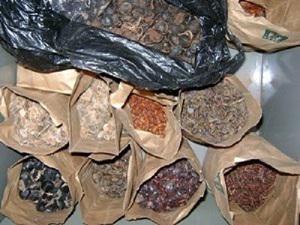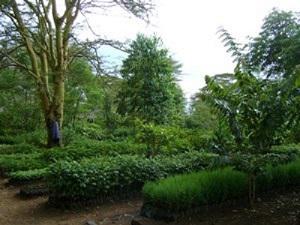Helen Thornton-Mutiso
This project aims to identify and map rare and endangered indigenous Kenyan tree species whilst increasing awareness of the local communities and to establish a seed bank with special focus on rare species, helping to increase the biodiversity of reforestation programmes.

Samples of indigenous tree seeds.
Closed canopy forest cover is estimated to be at only 1.7% in Kenya, against a UN minimum recommendation of 10%. Various reforestation programmes have been initiated in the country, but one of the key issues is a lack of viable seed source. This leads to replanting being done with a very small mix of more common species, leading to a loss of biodiversity and thus habitat and ecosystems for a wider range of flora and fauna.

African forest tree nursery.
In order to ensure a wider range of species are available this project aims to identify good trees for seed source, and to set up a seed centre, to ensure a much wider range of germplasm are available for reforestation projects.
The project will work firstly with the Kenya Boy Scout and Girl Guide Movement to train them in orienteering, and then they will start to explore the local area, listing the common trees and then identifying the unusual and rare trees for the area, noting the local names if known, and also collecting specimens for verification of identity, as well as marking their location on 1;10,000 maps.
We will then train 4 local community members in seed collection skills, so that they can start to harvest seed. These will be brought to our indigenous tree nursery, where we will set up a seed centre with post-harvest treatment equipment, drying facilities and basic storage equipment.
Seed will be processed, with details of provenance etc noted and stored, and then the centre will begin to supply to local nurseries and re-forestation projects, once it has registered with KEPHIS (Kenya Plant Health Inspectorate services) as a tree seed supplier.
As well as ensure greater biodiversity in tree planting initiatives, the project also aims to help to sensitise the wider community to the value of the rare and endangered species. In addition, as landowners will receive recompense when seed are collected from trees on their land, the project aims to give economic value to these trees thus helping to assist in their long-term survival.